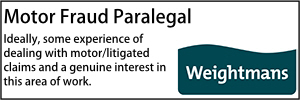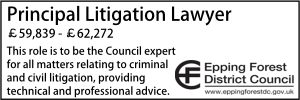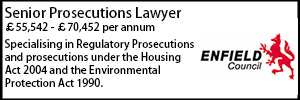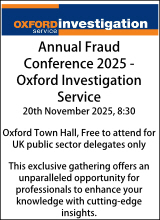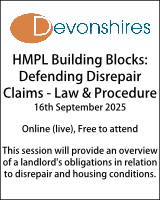Respondent put to election over CCFA by High Court
Practitioners will likely be familiar with disputes pertaining to the veracity of the funding arrangements within Detailed Assessment proceedings. Sean Linley reports on a recent case involving two local authorities where the High Court considered the approach to the election procedure within Detailed Assessment proceedings.
- Details
Speed read
The key issues in Saint Benedict's Land Trust Ltd v London Borough of Camden Council & Anor [2025] EWHC 1579 (Ch) (24 June 2025) can be summarised as follows:
- Within Assessment Proceedings the court has jurisdiction to require the receiving party to elect whether to disclose a particular document or whether to decline disclosure and rely on other evidence. This procedure is set out at 13.13 of PD 47.
- Whether or not an application for Election will be successful turns on whether a 'genuine issue' has been raised. The High Court here reflected that the paying party has to raise an issue which is "real and relevant" and not a "sham or fanciful".
- There is a presumption, in favour of the receiving party, that they are liable to pay their solicitor's costs. The High Court were clear that "this presumption is not displaced by the paying party simply putting the receiving party to proof of their entitlement of costs".
- Here the High Court held that a genuine issue was raised for two reasons; a. the outcome of the Petition Proceedings was unusual and therefore there was a question as to whether the trigger for a costs liability had been met in the Respondent's CCFA and b. the bar is set "fairly low" in terms of the test for determining whether a party should be put to its election.
- Where an Application for Election is made, the court should concern itself with the question of election rather than the outcome of that election. The initial decision had been wrong as the court had instead answered the question of whether the Respondent was liable to pay their solicitor's costs rather than whether 'genuine issue' had been raised.
- If the court allows an Application for Election it is then for the receiving party to determine what it wishes to rely upon, namely disclosure or some other evidence.
Background
The costs claim arose from a Winding Up Petition with the Appellant ordered to pay the Respondent's costs. At Detailed Assessment the costs were assessed in the sum of £26,287.15.
An issue, however, arose because the Appellant challenged whether or not the Respondent was liable to pay their solicitors the costs they were awarded. The Appellant had submitted that the outcome of the Petition Proceedings meant that the liability to pay costs may not have been triggered under the conditional fee agreements, leaving the Respondents with no liability for costs and by extension (and by virtue of the indemnity principle) no liability for the Appellant.
The Appellant made an application within the assessment proceedings to put the Respondents to their election (as per 13.13 of PD47) to disclose their retainers with their solicitor. The application was refused. The Appellant appealed this decision.
The High Court summarised the approach taken in the first instance decision thus:
"35. [...] the District Judge had asked himself the wrong question in the Bartley Judgment. The District Judge asked himself whether the outcome of the Petition Proceedings constituted a result which entitled GK to be paid under the terms of the CCFAs. The District Judge was satisfied, for the reasons which he gave, that the answer to this question was yes. This was not however the question which the District Judge was required to answer. The District Judge had to consider whether the Appellant had raised a factual issue in relation to the right of GK to be paid under the terms of the CCFAs which was a genuine issue, or a real and relevant issue, going beyond a sham or fanciful issue. The District Judge did address this question, at [101] in the Bartley Judgment, but by that point the District Judge had already reached his conclusion on the substantive question of whether GK had a right to be paid under the CCFAs, which effectively determined his answer to the question considered at [101]. In my view this meant that the District Judge had not adequately addressed himself to the question which had to be answered."
The Election Procedure
The High Court considered the Election Procedure and the application of the same:
"27. The jurisdiction of the court, in detailed assessment proceedings, to require the receiving party to elect whether to disclose a particular document to a paying party is contained in paragraph 13.13 of the Practice Direction to Part 47 of the CPR ("Paragraph 13.13"). Paragraph 13.13 is in the following terms:
"The court may direct the receiving party to produce any document which in the opinion of the court is necessary to enable it to reach its decision. These documents will in the first instance be produced to the court, but the court may ask the receiving party to elect whether to disclose the particular document to the paying party in order to rely on the contents of the document, or whether to decline disclosure and instead rely on other evidence."
28. As can be seen, Paragraph 13.13 becomes relevant where the court decides that it needs to see a particular document in assessment proceedings which, in the opinion of the court, is necessary in order to enable the court to make a decision in the assessment proceedings. In the first instance the relevant document only has to be produced to the court. The court can however ask the receiving party to elect whether to disclose the particular document to the paying party in order to rely on the contents of the document or, in the alternative, to decline disclosure and instead rely on other evidence.
29. By the Election Application the Appellant is not, as such, seeking an order of the court. What the Appellant is seeking is the agreement of the court to make a request to the Respondents, pursuant to Paragraph 13.13, for the Respondents to elect whether to disclose the CCFAs, or to decline disclosure and prove its liability to pay costs to GK in reliance upon other evidence."
The Relevant Law
The High Court next examined the relevant case law and authorities pertaining to the Election Procedure:
38. I have already set out Paragraph 13.13. The problem of how privileged documents should be dealt with, in (as it then was) the taxation of costs, was considered by Hobhouse J (as he then was), sitting with assessors, in Pamplin v Express Newspapers Ltd [1985] 1 WLR 689. In that case the defendants commenced a taxation of bills prepared under two orders for costs made against the plaintiff, and lodged documents in accordance with what was then RSC, Order 62, rule 21. The documents were examined by the taxing master and were returned to the defendants at the taxation of the bills. The plaintiff was dissatisfied with some items allowed on taxation and applied for a review, objecting, amongst other matters, to not being permitted to examine the documents which had been lodged by the defendants. On the review the taxing master held that the plaintiff was not entitled to examine the defendants' privileged and confidential documents and rejected the plaintiff's objection. The plaintiff then applied for a review of the taxation by a judge. The application was dismissed.
39. The essential reasoning of Hobhouse J and the assessors, in dismissing the application, was as follows. A factual dispute might arise on a taxation or on a review which would require a claimant in the taxation (as the receiving party was referred to) to adduce privileged documents in order to prove their claim. In such circumstances the claimant could be required to elect whether to waive their privilege or to retain the confidentiality of the documents and prove their claim some other way. When a claimant lodged their documents in accordance with Order 62, rule 21 they did not have to make any election at that stage. In these circumstances, and on the facts of Pamplin, the defendants had never reached the stage where they were required to elect whether to waive their privilege. As such, the plaintiff was not entitled to see the defendants' documents and the taxation and review had been properly conducted.
40. In their judgment Hobhouse J and the assessors also took the opportunity to address the problems which could arise when dealing with privileged documents. At 691A and 691F-G, Hobhouse J identified the competing principles in the following terms:
"The first principle is the principle of natural justice which applies wherever legal proceedings involve more than one person, and one party is asking the tribunal for an order which will affect and bind another. Natural justice requires that each party should have an equivalent right to be heard. This means that if one party wishes to place evidence or persuasive material before the tribunal, the other party or parties must have an opportunity to see that material and, if they wish, to submit counter material and, in any event, to address the tribunal about the material. One party may not make secret communications to the court."
"The second principle is the right of a party to keep confidential, and not disclose to his opponent (or the court), documents or transactions covered by legal professional privilege. This principle is also one which is directed to the achievement of justice. If parties are to be able to protect their legitimate legal interests and properly conduct their litigation in an adversarial situation, they must be able to communicate confidentially, and so must their legal advisers. This privilege can be waived by the party for whose benefit it exists. One of the ways in which this privilege can be waived is by adducing a privileged document in evidence, or giving evidence about privileged communications as, for example, adducing statements given to solicitors under the Civil Evidence Acts. Such waiver has been discussed in a number of cases, including Great Atlantic Insurance Co. v. Home Insurance Co. [1981] 1 W.L.R. 529 and General Accident Fire and Life Assurance Corporation Ltd. v. Tanter [1984] 1 W.L.R. 100. The waiver consequent upon adducing a particular item of privileged material may not necessarily be confined to that specific item."
41. Hobhouse J went on to confirm, at 695F, that the principles of natural justice applied in taxations as much as in other litigation:
"Taxation, although adversarial, is not subject to all the incidents of ordinary litigation. R.S.C., Ord. 62 is, for present purposes, a self-contained code. The provisions of other orders for discovery and inspection of documents, etc. do not apply. However, it cannot be disputed that the rules of natural justice apply to taxation proceedings, and the question of principle which I have to decide on the present appeal is how the requirements of justice are best served in taxation proceedings, having regard to the fact that many of the relevant documents will be privileged, and the claimant may have a legitimate interest in protecting that privilege."
42. Hobhouse J then proceeded to set out the answer to the problem of dealing with privileged documents, at 695G-696B:
"The answer is that, ultimately, the principle that each party must have the right to see any relevant material which his opponent is placing before the tribunal, and which that tribunal is taking into account in arriving at its decision, must prevail. In the final resort, the claimant must be put to his election whether he wishes to waive his privilege and use the material, or to assert his privilege and retain the confidentiality of the document which the respondent is asking to see. In most taxations, the point where the respondent wishes to put the claimant to his election is never reached. The vast bulk of taxations are informal and involve questions of the simple assessment of the value of the work done or its justification or valuation as a party and party item. In such situations, the parties are content to rely on the extensive experience and expertise of the master. All parties are interested in completing the taxation expeditiously, efficiently and at a minimum cost. The respondent will normally have no interest in making the taxation more complicated or expensive. It is the duty of the master to conduct the taxation as efficiently and economically as is consistent with doing justice to both sides. It is his duty to prevent the respondent from misusing or abusing the taxation proceedings. The procedure currently followed by taxing masters is designed to achieve these ends and does justice."
43. In terms of the circumstances in which the taxing masters should require a party to prove an entitlement to costs, and be put to their election, Hobhouse J formulated the following test, at 696H to 697B (the underlining is my own):
"The master does not have any power to order discovery to be given; he does not have any power to override a right of privilege. But it is the duty of the master, if the respondent raises a factual issue, which is real and relevant and not a sham or fanciful dispute, to require the claimant to prove the facts upon which he relies. The claimant then has to choose what evidence he will adduce and to what extent he will waive his privilege. That is a choice for the claimant alone. The master then has to decide the issue of fact on the evidence. In considering whether he is satisfied by the evidence, the master will no doubt take into account that the claimant may have a legitimate interest in not adducing the most obvious or complete evidence, and may prefer to rely on oral evidence rather than producing privileged legal documents. What I have said about the essentials of the situation mirrors what was said by Sir John Donaldson M.R. in the WEA Records case [1983] 1 W.L.R. 721, 724."
44. It was not in dispute before me, on the hearing of the Appeal, that the principles set out in Pamplin are also applicable to assessments of costs pursuant to the CPR and, in particular, to the application of Paragraph 13.13.
45. As it seems to me, the essential test which emerges from Pamplin, before the receiving party can be put to their election in detailed assessment proceedings, is whether the paying party has raised a factual issue which is "real and relevant" and not "a sham or fanciful dispute".
46. A further articulation of essentially the same test can be found in the judgment of the Divisional Court in Hazlett v Sefton Metropolitan Borough Council [2000] 4 All ER 887. In this case the issue was whether the complainant, in a case of statutory nuisance, was entitled to an order compensating her for expenses properly incurred in the statutory nuisance proceedings. The expenses in question were the cost of the complainant's solicitors. This in turn led to the question of whether the complainant was liable to pay any costs to her solicitors. The complainant produced a letter, which was said by the respondent local authority not to constitute an enforceable fee agreement. The complainant and her solicitor declined to give evidence on the question of whether there was a liability to pay the solicitors' fees. The complainant appealed to the Divisional Court against the decision of the magistrate to refuse the claim for compensation on the basis that the complainant had not proved that she had properly incurred expenses in the proceedings. The appeal was allowed, on the basis that the magistrate had failed to address the questions of whether the complainant could rely on the presumption that she would be liable to pay her solicitors' costs, or whether the complainant should have been required to adduce evidence.
47. For present purposes the judgment of the Divisional Court is relevant for the guidance which was given on the question of whether the complainant should have been required to produce further evidence, at 892j-893b (the underlining is my own):
"In our judgment, it is reasonable to assume in those circumstances that, where the complainant has a solicitor acting for him in pursuing his complaint, he will be liable to pay his solicitor's costs of doing so. In other words, there is normally a presumption that the complainant will be personally liable for his solicitor's costs and it should not normally be necessary for the complainant to have to adduce evidence to that effect. Such an approach would be consistent with that adopted in the case of R v Miller where, although the factual circumstances were different, the wording of the relevant statutory provisions in the 1973 Act is very similar to the wording of s 82(12) of the 1990 Act. The complainant will therefore be able to rely on the presumption that he is liable for his solicitor's costs where there is no effective challenge to it.
Where, however, there is a genuine issue raised by the defendant as to whether the complainant has properly incurred costs in the proceedings, the position will be different. A defendant may, for instance, have grounds for believing that the complainant will not be liable to pay his solicitor's costs, whether because he has entered into an unlawful and unenforceable conditional fee arrangement with his solicitor or for any other reason. In those circumstances, where the defendant has raised a genuine issue as to whether the complainant has properly incurred costs in the proceedings, the complainant will be at risk if he continues to rely on the presumption that he is liable for his solicitor's costs. If he does not then adduce evidence to prove that he has properly incurred costs in the proceedings and the defendant can show by evidence or argument, that he has not, he would be most unlikely to succeed in recovering his costs."
48. Finally, I should make reference to Hollins v Russell [2003] EWCA Civ 708. In this case the Court of Appeal had to deal with six appeals, all of which were concerned with the enforceability of conditional fee agreements which had been enabled by the Courts and Legal Services Act 1990. The judgment of the Court of Appeal, given by Brooke LJ, is lengthy. For present purposes I need only quote from the judgment at [55] and [56], where Brooke LJ described the practice of the courts on assessment, in relation to the disclosure of documents to the paying party or their solicitors (the underlining is my own):
"55. In order to explain our conclusions, it is necessary to describe the practice on assessment as respects the disclosure of documents to the paying party or his solicitors. Although all relevant documents must be filed with the court, there is no automatic disclosure of these documents to the paying party. However, paragraph 40.14 of the Costs Practice Direction provides (in relation to detailed assessment) as follows:-
"40.14 The court may direct the receiving party to produce any document which in the opinion of the court is necessary to enable it to reach its decision. These documents will, in the first instance, be produced to the court, but the court may ask the receiving party to elect whether to disclose a particular document to the paying party in order to rely on the contents of the document, or whether to decline disclosure and instead rely on other evidence."
56. Reference to the case law demonstrates the circumstances in which the court will exercise its discretion under this rule. In Goldman v Hesper [1988] 1 WLR 1238, the Court of Appeal held that it would be rare to exercise this discretion under Order 62, rule 29 of the Rules of the Supreme Court 1965, which contained provisions now to be found in CPR 47.6 and that part of the Costs Practice Direction that relates to CPR Part 47. By lodging his documents with the court, the claimant waived his legal professional privilege to that extent. If there was a challenge in good faith to any item of costs, the taxing master could put the receiving party to his election and if the document was produced disclosure would be for the specific purpose of taxation of costs only. Accordingly, the privilege could be asserted on other occasions thereafter."
49. Although Hollins was concerned with a series of cases involving conditional fee agreements made under the former regulations for conditional fee agreements, which gave considerably more scope for challenging their enforceability on assessment, it seems to me that the extract which I have quoted from Hollins is not confined, as a statement of principle, to the regulations then in force. It seems to me that the statement of principle is capable of more general application.
50. I was referred to other authorities at the hearing of the Appeal, but it seems to me that the three authorities referred to above are sufficient to demonstrate the principle which should be applied when the paying party in a detailed assessment seeks to have the receiving party put to their election as to whether to produce a privileged document on which the receiving party relies in the detailed assessment.
51. As I have said, the essential test, before the receiving party can be put to their election in detailed assessment proceedings, is whether the paying party has raised a factual issue which is real and relevant and not a sham or fanciful dispute. Putting the matter another way, and adopting an expression which is also used in the case law, there must be a genuine issue raised by the paying party, based upon a challenge made in good faith.
52. To this I would add the point, which can also be derived from the above case law, that there is a presumption, in favour of the receiving party, that the receiving party is liable to pay the costs of their solicitors. This presumption is not displaced by the paying party simply putting the receiving party to proof of their entitlement to costs. A genuine issue as the liability of the receiving party to pay their solicitors' costs is required before the presumption is displaced and the paying party can be called upon to produce evidence of such liability.
The Decision
The High Court considered the witness evidence relied upon in the original assessment proceedings though made it clear that there would be no decision made on the CCFA or its terms. The sole question the court had to consider was whether the Respondents were under an obligation to disclose the CCFAs or whether the Respondents should be put to their election to do so.
59. My analysis is necessarily very short. As I have explained, it is not appropriate for me to set out or discuss the terms of the CCFAs.
60. So far as the costs, as claimed by the Respondents in the Assessment Proceedings, represent disbursements of GK, as opposed to GK's own charges, there is no genuine or indeed any issue raised by the Appellant. It is quite clear from the terms of both of the CCFAs, that properly incurred disbursements are to be paid by the Respondents, whatever the outcome of the claim in respect of which such disbursements are incurred.
61. So far as GK's own fees are concerned, the position is not the same. In my view the Appellant has raised a genuine issue or dispute as to the liability of the Respondents to pay these fees under the CCFAs , as opposed to a sham or fanciful issue or dispute. I say this for two reasons which, for the reasons which I have explained, I express very briefly.
62. First, the outcome of the Petition Proceedings was somewhat unusual. The sum which was paid with the intention of satisfying the Petition Debt was paid, but was then returned, in circumstances where Judge Halliwell decided that the Respondents had not been justified in returning the payment. The Petition was dismissed, but the Respondents were awarded their costs of the Petition Proceedings up to 20th November 2020. Looking at the terms of the CCFAs and the outcome of the Petition Proceedings, I do not find it possible to conclude that there is no issue at all as to whether the trigger for payment of GK's own fees under the CCFAs was actually released.
63. Second, the bar is set fairly low, in terms of the test for determining whether a party should be put to its election pursuant to Paragraph 13.13. All that has to be shown is a genuine issue. There is also the concern that any court will have in making a decision on a document in circumstances where one party has not seen that document or had the opportunity to address its terms. While I do not doubt that courts should be robust, in assessment proceedings, in dismissing challenges of this kind which are clearly tactical and have no merit, I do not feel able to place the Appellant's challenge into this category. In my view the Appellant has surmounted the relatively low bar of demonstrating a genuine issue.
64. I should make it clear, candidly, that I reach this result with no enthusiasm. I repeat the postscripts which I included at the end of the Appeal Judgment. I would much prefer to have been able to dismiss the Election Application, so that the Assessment Proceedings could be brought to an end, the costs generated by the Election Application could be prevented from escalating further, and the outstandings costs payable pursuant to the Halliwell Order could be paid. For the reasons which I have given, however, I am not able to dismiss the Election Application.
65. I should also make it clear that the Appellant should take no encouragement from this decision. All that I have decided is that the Appellant has surmounted the relatively low bar of demonstrating a genuine issue, so far as GK's own fees in the Petition Proceedings are concerned. I have made no decision upon, and I express no view upon the substantive issue of whether the Respondents are liable, under the terms of the CCFAs, for GK's fees of the Petition Proceedings. Assuming an election to disclose the CCFAs, that substantive issue will be for the court charged with the determination of that issue.
66. The issue raised by the Appellant is whether the Respondents are liable to pay that element of the costs awarded to them by the Halliwell Order which represents GK's own fees of the Petition Proceedings. For the reasons set out in this judgment, I conclude that it is appropriate for the court, pursuant to Paragraph 13.13, to ask the Respondents to elect whether (i) to disclose the CCFAs to the Appellant in order to rely on the contents of those documents in order to prove their liability to pay the relevant costs, or (ii) to decline disclosure and instead rely on other evidence to prove their liability to pay the relevant costs.
The outcome of the Election Application and the next steps
67. The Election Application is allowed. Pursuant to Paragraph 13.13, the Respondents will be asked to make their election in relation to the CCFAs.
Practice points
It is somewhat noteworthy that the High Court took no satisfaction in allowing the appeal, mindful of the costs which had been expended on the assessment proceedings and the further costs which would be incurred.
The judgment gives clear guidance on how the Election Procedure should be approached making it plan that a genuine issue must be established by the paying party. It is also very clear that the court will be robust where there is not one and that there is a presumption that the receiving party is liable for its solicitors costs. Further, that "this presumption is not displaced by the paying party simply putting the receiving party to proof of their entitlement of costs". This ought to give receiving parties reassurance.
It's also important to consider that where the issue arises thought will have to be given as to whether to disclose the disputed documents or produce & rely on alternative evidence. If alternative evidence is going to be relied on it is important that the same is sufficiently robust.
If you find yourselves facing requests for disclosure (particularly relating to privileged documents) or put to election within any assessment proceedings then seek out specialist advice which can guide on you such issues and the appropriate approach.
Sean Linley is a Senior Costs Draftsperson at Carter Burnett.
Trust Solicitor (Public & Healthcare Law)
Trust Solicitor (Employment & Contract Law)
Locums
Poll






